Artificial Intelligence
in Pediatric Care
A groundbreaking alternative
in pediatric diagnostics
Kid AID addresses the needs of young medical professionals who have basic knowledge in pediatrics, neonatology, and developmental emergency medicine but lack practical experience.
Regardless of the field of science in which we wish to broaden our horizons, one thing is certain — nothing beats hands-on experience. While studying textbooks and scientific publications is a key part of learning, it’s only when we apply what we’ve learned in real-life situations that we can truly understand the subject.
The same applies in medicine — young practitioners spend many hours learning about the functioning of the human body and the pathophysiology of diseases, but it’s only through caring for patients that they discover the true meaning and application of the theory.
A core part of the Kid AID project will be the development of an educational app designed to meet the needs of young healthcare professionals. They may have a basic understanding of pediatrics, neonatology, and emergency medicine for developmental age, but lack practical experience.
Stages of the Kid AID Project
How will we develop tools to support healthcare professionals in assessing the general condition of infants and young children?
Step 1
Database building – collecting patient clinical histories and recordings made in emergency departments.
Step 2
Development of the educational application “Kid AID Coach.”
Step 3
Creating the final AI-based tool to support the process of assessing a child's general condition and making medical decisions.
Who will use our app?
The Kid-AID educational application will serve as an excellent addition to the theory acquired at various stages of education and will allow medical professionals to address the youngest patients with a more confident approach.
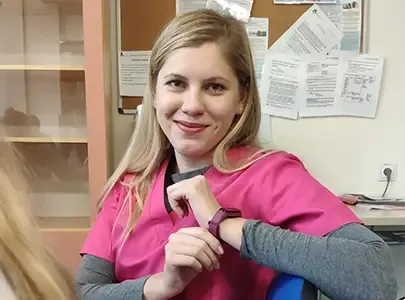
Students of: Medicine, Nursing, Midwifery, Emergency Medical Services
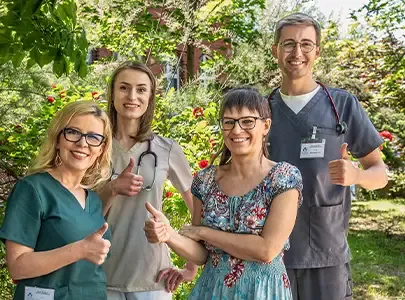
Intern doctors and medical residents
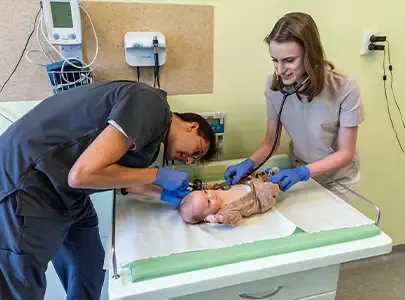
Doctors working in primary healthcare, urgent or emergency care, and out-of-hours medical care
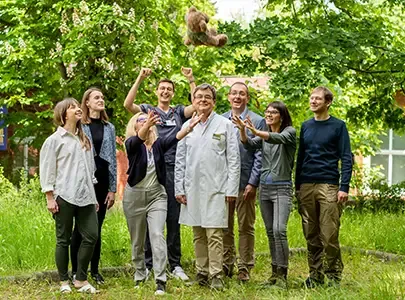
Healthcare professionals who have contact with pediatric patients in their daily practice
What is the purpose of our app?
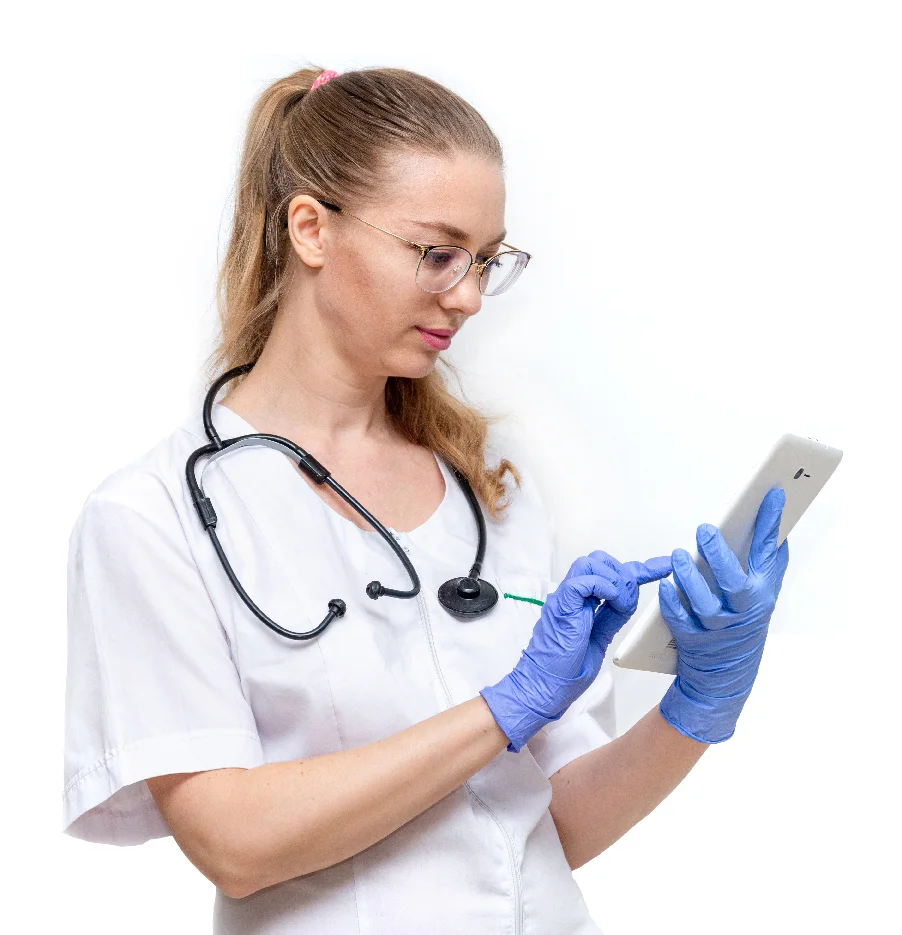
The educational application will prepare the user to conduct a pediatric visit following the standards of good medical practice.
Medical history
The user will be presented with a brief medical history, which includes the information provided by the parents as the reason for bringing the child to the doctor. This information will help organize the patient's history before the medical consultation.
Audiovisual materials
In the next step, the application will present the user with an audiovisual material showing a short video of the child. The base of this material will be recordings collected as part of the Kid AID project. Additionally, the values of vital parameters will be displayed, including information on body temperature, oxygen saturation, heart rate, and breaths per minute.
Child’s general condition assessment
In the next step, the user will be asked for a subjective assessment of the child’s condition — whether they believe that a patient with their medical history, presenting in the way shown during the examination and displaying specific values for the tested parameters, requires hospitalization and further diagnostic testing, or if the patient can be treated at home.
Proposing Diagnostic Procedures and Treatment
The next step will involve the user proposing diagnostic procedures based on the needs, such as laboratory tests, microbiological tests, and imaging diagnostics. The following step will be to propose a treatment plan.
Assessment of Proposed Decisions
After completing all of the steps, the user will receive feedback on the decisions they made, including an assessment of their validity, priority for implementation based on the clinical condition, comments on optimal treatment, and in some cases, a "follow-up" — information on how the decisions impacted the further course of the illness.
Kid AID — Artificial Intelligence in Pediatric Healthcare
Artificial intelligence in medicine is not just the future; it is already here. The application our team is working on has the potential to become a groundbreaking tool. It can assist doctors in assessing children's health. As a result, it may not only increase diagnostic accuracy but also improve the comfort of patients and their families. On one hand, it may reduce unnecessary hospitalizations, while on the other hand, it could increase awareness of rare, life-threatening conditions.
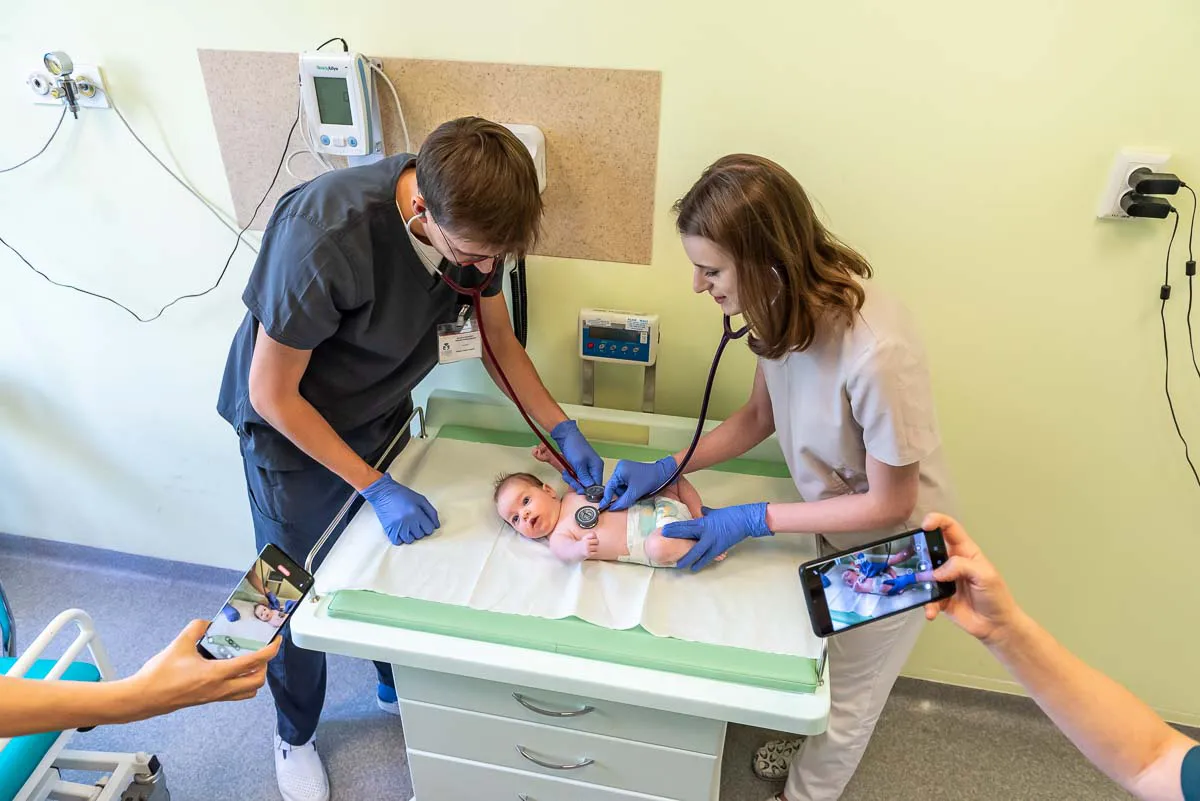
The answer is YES!
Kid-AID is a project aimed at creating tools based on artificial intelligence (AI) algorithms to assist healthcare professionals in making decisions regarding the treatment of children in emergencies.
Imagine a scenario: It’s a Friday evening. Lucy, an 8-month-old, starts to develop a high fever. She has a temperature of 39°C, is fussy, refuses to eat, and can’t sleep. Concerned, her parents take her to the Emergency Room. The on-call doctor lacks experience in assessing infants and, as a precaution, asks for a consulting specialist. They have to wait another 3 hours. By the time Lucy is seen by a specialist, it is already 11:30 PM. The baby is crying, and it’s hard to assess whether she is seriously ill or just tired. As a precaution, she is admitted to the hospital, taking the last available bed. Shortly afterward, another child in much worse condition arrives at the hospital. The search for space in another hospital begins…
Such situations occur every day, in every city, and not only in Poland. Why? Because assessing the health condition of infants and young children is a great challenge. It takes experience and practice to be confident in decision-making.
Medical University of Wrocław, in collaboration with Animativ and thanks to cooperation with St. Jadwiga Hospital in Trzebnica and Specialist Hospital in Wałbrzych, is leading a pioneering project that utilizes artificial intelligence (AI) to assist healthcare professionals in making critical decisions regarding the health of young patients.
Every day, thousands of children arrive at emergency departments with various symptoms. Studies show that only 4-6% of these cases require immediate medical intervention, and only 20% of children need hospitalization.
This means that many hospitalizations could be avoided if doctors had precise tools to assess a child's health condition.
Experienced pediatricians intuitively recognize the "ill appearance" of a seriously ill child, based on signals such as:
- the child's activity,
- breathing,
- skin tone,
- the child's behavior and responses.
Unfortunately, many of these signals are subjective and depend on the doctor’s experience. As a result, many cases are hospitalized even though they do not require immediate medical intervention.
A team led by Kamila Ludwikowska, MD, and Prof. Leszek Szenborn from the Department and Clinic of Pediatrics and Infectious Diseases at the Medical University of Wrocław is developing an AI-powered application. The goal of this app is not to replace the doctor, but to assist in assessing a child’s condition in difficult cases.
The application will:
- analyze short video recordings of children,
- use AI algorithms to identify critical symptoms such as breathing disturbances, movement pattern abnormalities, skin tone changes, and weakened responses,
- provide suggestions on whether immediate medical assistance, hospital observation, or further diagnostics are necessary.
As Kamila Ludwikowska, MD, emphasizes, AI "will not make a diagnosis," but it can successfully aid doctors in making assessments, particularly in areas where there is limited access to experienced staff or advanced diagnostic equipment.
Creating a Knowledge Database
The database will include:
- video recordings of young patients in varying health conditions,
- information on the course of the illness in children, such as symptoms, test results, medical history, and interventions taken.
The recordings, which will be made at the clinic in Wrocław and at the hospitals in Wałbrzych and Trzebnica, will allow algorithms to "learn" from real cases. As a result, the application will gain the ability to recognize subtle signs of a child's severe health condition.
In addition to supporting medical decision-making, the application has immense educational potential. Young doctors, medical students, and paramedics will be able to access the clinical case repository to gain experience in assessing children's health conditions.
Medical staff training focuses on the presence of specific symptoms and abnormalities. However, infants and young children display a wide range of behaviors that often fall outside these standard guidelines. To recognize when "something is off," it is essential to observe numerous examples of normal child behavior patterns. The recordings and histories of young patients collected for the Kid-AID project can serve as numerous examples, helping to understand the diversity of behaviors and symptoms in children both in health and illness. This will allow healthcare professionals to develop the skill of appropriately assessing a child's health condition more quickly. Additionally, they will have the opportunity to observe and learn about rare clinical cases of serious diseases in a much more comprehensive and accurate way than textbook descriptions provide.
As Prof. Szenborn emphasizes, this is especially important in times when, thanks to vaccinations, children are less likely to suffer from infectious diseases like meningococcal sepsis. While this is a beneficial change for population health, it also makes it more challenging for young doctors to gain practical knowledge in this area.
The project is being carried out in collaboration with Animativ Sp. z o.o., a company specializing in digital-medical solutions. This collaboration ensures the integration of medical knowledge with modern technologies.
Our Team
Project Manager:
dr n. med. Kamila Ludwikowska
Expert Supervision:
Prof. dr hab. Leszek Szenborn
dr hab. Henryk Szymański
dr n. med. Waldemar Gołębiowski
Agnieszka Siennicka, PhD in Health Sciences
Coordinators:
Department and Clinic of Pediatrics and Infectious Diseases at the Medical University of Wrocław - Adam Łęcki, MD, Katarzyna Preisner, MD, Monika Tokarczyk, MD
St. Jadwiga Hospital in Trzebnica - Adrianna Górniak-Oktaba, MD
Alfred Sokolowski, MD, Specialist Hospital in Wałbrzych - Piotr Stecko, MD, Damian Struck, MD
Technology Transfer Center at Medical University of Wrocław - Jakub Sojka
Technical Supervision:
Project Coordination - Marcin Kwiatkowski, Diana Starzyńska, Makki Alkurdi, MD
Website, UI/UX - Iwona Kwiatkowska, Justyna Golcew, Jakub Choszcz
Programming and System Support - Filip Sankowski, Maciej Peciak, Kacper Królak, Tomasz First, Piotr Kołodziej
Technology and Hardware Design - Łukasz Kawka, Dominik Liśkiewicz
Translator:
Aleksandra Bryzik